Dirt Contractors York
Top 10 Dirt Removal in York
Receive 3 FREE Dirt Contractors quotes for your project today! Compare profiles, reviews, accreditations, portfolio, etc... and choose the best deal.
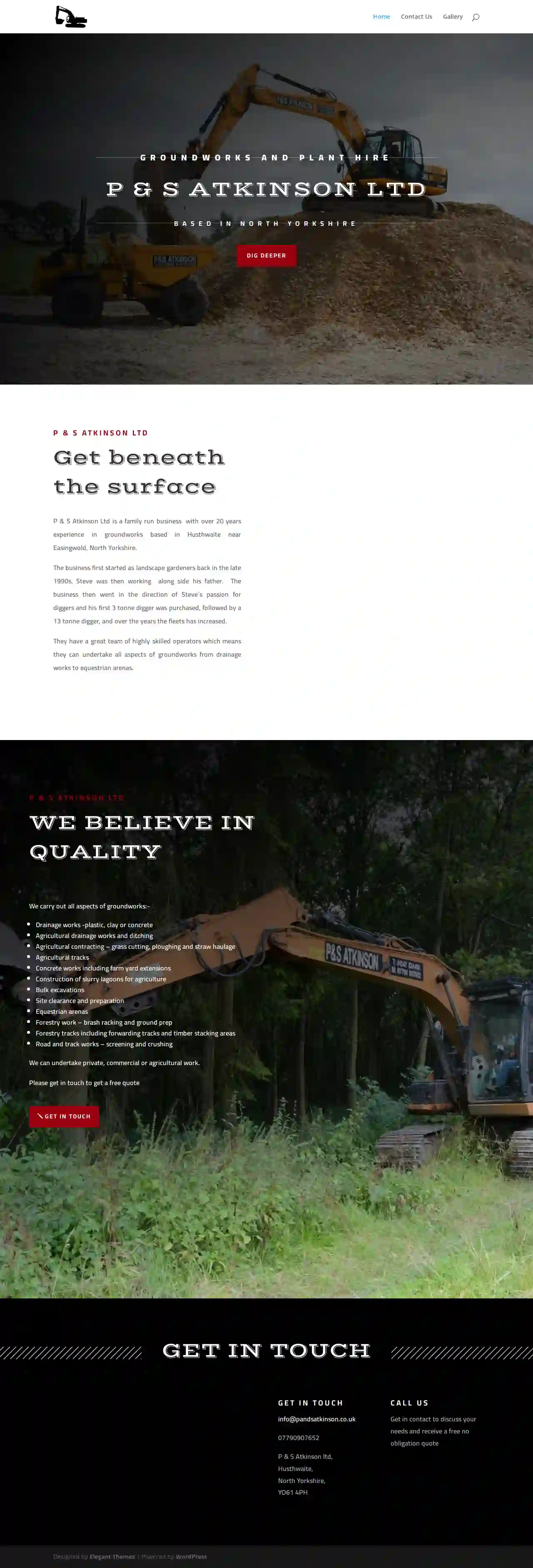
P & S ATKINSON LTD
Husthwaite, Easingwold, YO61 4PH, GBP & S Atkinson Ltd Get beneath the surface P & S Atkinson Ltd is a family-run business with over 20 years of experience in groundworks based in Husthwaite near Easingwold, North Yorkshire. The business first started as landscape gardeners back in the late 1990s, Steve was then working alongside his father. The business then went in the direction of Steve's passion for diggers and his first 3-tonne digger was purchased, followed by a 13-tonne digger, and over the years the fleet has increased. They have a great team of highly skilled operators which means they can undertake all aspects of groundworks from drainage works to equestrian arenas.
- Services
- Why Us?
- Gallery
Get Quote
Northstar Civil Engineering Ltd.
52 reviewsLauren House, Suite 137A Wakefield Road, Fenay Bridge, Huddersfield, HD5 0AN, GBWe are Northstar Civil Engineering Ltd YOUR PARTNER IN CONSTRUCTION We are a civil engineering and construction company working within Yorkshire and the surrounding areas. With the experience and expertise that Northstar Civil Engineering has to offer, we undertake most forms of Civil Engineering. We are fully accredited, trained professionals in all manner of civil engineering and groundworks projects using modern machinery and best practises, we can complete the job efficiently with the highest degree of excellence. Our genuine passion for construction along with our experience and diligence plays a huge role in our ability to complete projects on time and within budget whilst not compromising on the quality of our services. LOOKING FOR A CIVILS CONTRACTOR FOR YOUR NEXT PROJECT? Speak to our one of team today for a quotation
- Services
- Why Us?
- Gallery
Get Quote
LC Plant Services LTD - Mobile Plant & Forklift Truck Repair
3.73 reviewsUnit 3PKP Trading Estate, Carr Wood Road, Unit 3PKP Trading EstateCarr Wood RoadCastleford West Yorkshire, Castleford, WF10 4SB, GBAbout LC Plant Services Ltd. Founded in 2014, LC Plant Services Ltd has become a strong team within the Construction Plant, Machinery & Material Handler sector. With our dedicated office & service team, we can assist you with all your machinery repair requirements. From site breakdowns to major overhauls, we can carry out anything you may require. We offer a dealership level of service, providing diagnostics, repairs, and honest advice across Yorkshire and the UK. We are Yorkshire's No. 1 choice for all Mobile & Construction Plant Machinery Repair & Maintenance with National coverage due to our ever-growing fleet of Service Engineers! LC Plant Services Ltd is a fully independent, professional mobile plant machinery, Quarry plant machinery, Construction plant, forklift truck & static plant maintenance repair & service company. We offer our customers a full-rounded service for all plant & machinery needs, from interim inspections, servicing, repairs, LOLER / PUWER Examinations, transport and plant hire, all at competitive prices. Based in Pontefract West Yorkshire, we offer reliable effective breakdown & major repair & servicing solutions throughout the Yorkshire & The Humber regions to all brands & models of 360 & 180 degree Excavators, Mini Diggers, Dumpers, Rollers, Loading shovels, Skidsteer loaders, Forklift trucks, Generators, Compressors & any other powered hydraulic equipment. Diesel engine diagnosis & repair specialist & auto electrics carried out. We can offer state-of-the-art Diagnostics + Remapping services to increase power levels & more. Our high level of experience guarantees customers minimal downtime due to our extensive knowledge of all aspects of machinery component diagnosis and repair. Fully LEEA accredited to carry out on-site Loler/Puwer thorough examinations to mobile plant, forklift trucks, HIABS, cranes, lifting equipment & static plant. Plant machinery & forklift truck transport specialists. Local or nationwide, site moves, machine recovery, general transport, please contact us for a competitive quote.
- Services
- Why Us?
- Accreditations
- Our Team
- Gallery
Get Quote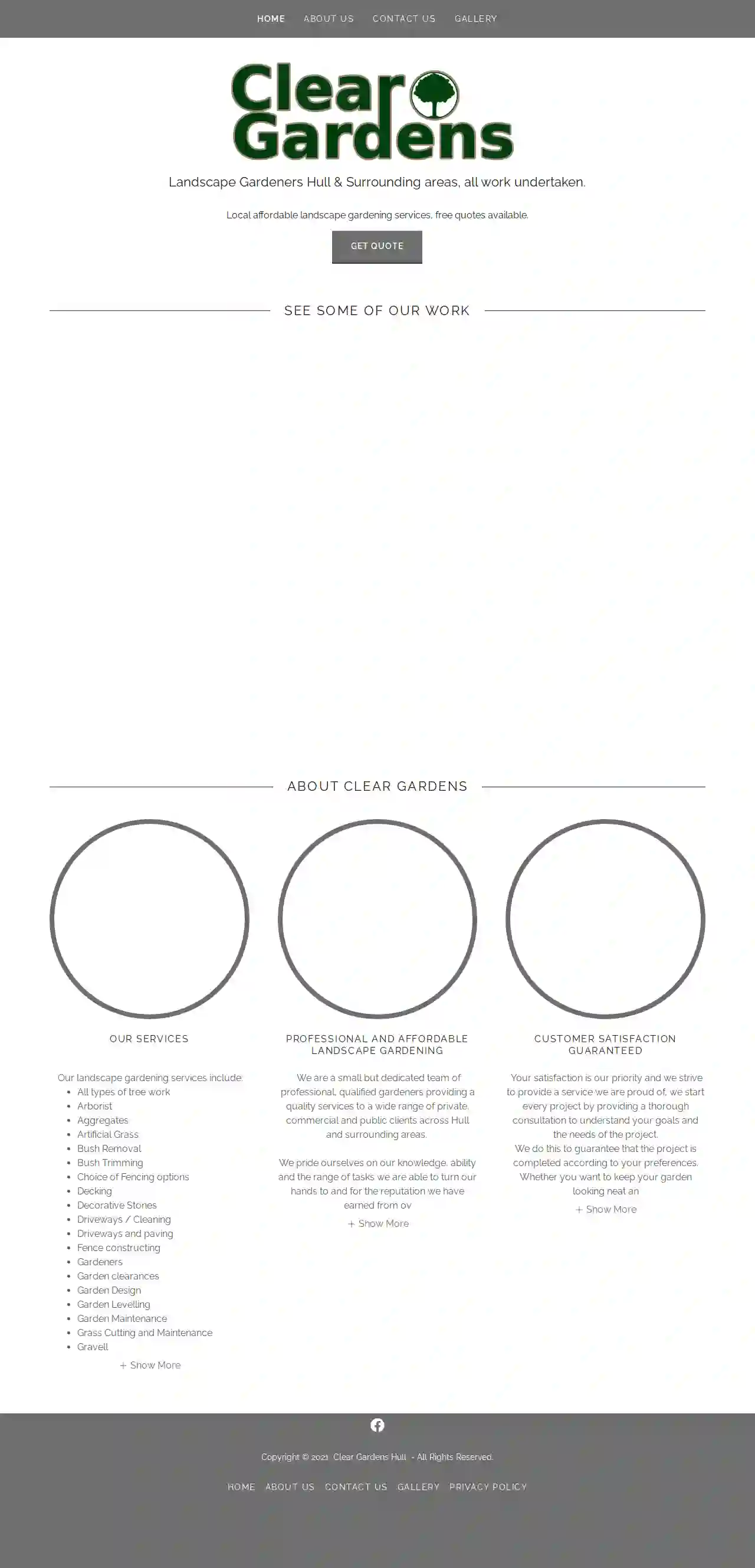
Clear Gardens - Landscape Gardeners Hull
4.421 reviews14 Aberford Walk, Hull, HU9 5EN, GBOur History Established in 1997, Clear Gardens has been providing all types of Landscape Gardening services to Hull and the East Riding of Yorkshire for over 20 years. We are a small, fully qualified and experienced team of professionals, undertaking all types of gardening contracts, whether it's a patch of grass being turned into a driveway or a rickety old fence being replaced with quality treated timber. We can help you. We've been called "The Best Gardeners in Hull" - contact us today to find out why! How we work We work from start to finish to ensure our customers are happy with the project and in control the entire time. We offer a wide range of services to both commercial and residential customers.
- Services
- Why Us?
- Gallery
Get Quote
Core Groundworks York Ltd
510 reviewsYork, GBAbout Core Groundworks York Ltd Small team; big passion. Who are we? Core groundworks york ltd has grown year on year to become one of the best recognised and respected groundwork and drainage contractors in Yorkshire. We have a long established client base within the Domestic & Commercial sector. We continue to consistently deliver projects ahead of schedule and to the total satisfaction of our clients. Our aftercare service is also something we take great pride in and our clients have consistently expressed their gratitude for the prompt attention given to all aftercare requests. Our focus on quality, flexibility and delivery are complimented and augmented by our strict attention to safe working practices with our emphasis on current health and safety procedures while always being mindful of our commitment to the environment. Chris Director Matt Director
- Services
- Why Us?
- Our Team
- Testimonials
- Gallery
Get Quote
AH Construction
31 reviews3 Stoney Bank Chase, Thongsbridge, 3 Stoney Bank Chase Thongsbridge, HD9 7UD, GBWelcome to A H Construction A H Construction is a team of building contractors specializing in a range of building services, including groundworks, house extensions, and new builds. Based in Holmfirth and serving all surrounding areas around Huddersfield, we offer a professional, friendly service to domestic and commercial customers alike. With over 10 years of industry experience, our extension and house builders deliver quality workmanship at a competitive price. Since our establishment in 2017, our team has developed a reputation as a dependable, customer-focused building company which can handle any type of construction project. Contact one of our new home builders today to find out more. We also have a company blog where you can learn more about our services.
- Services
- Why Us?
- Gallery
Get Quote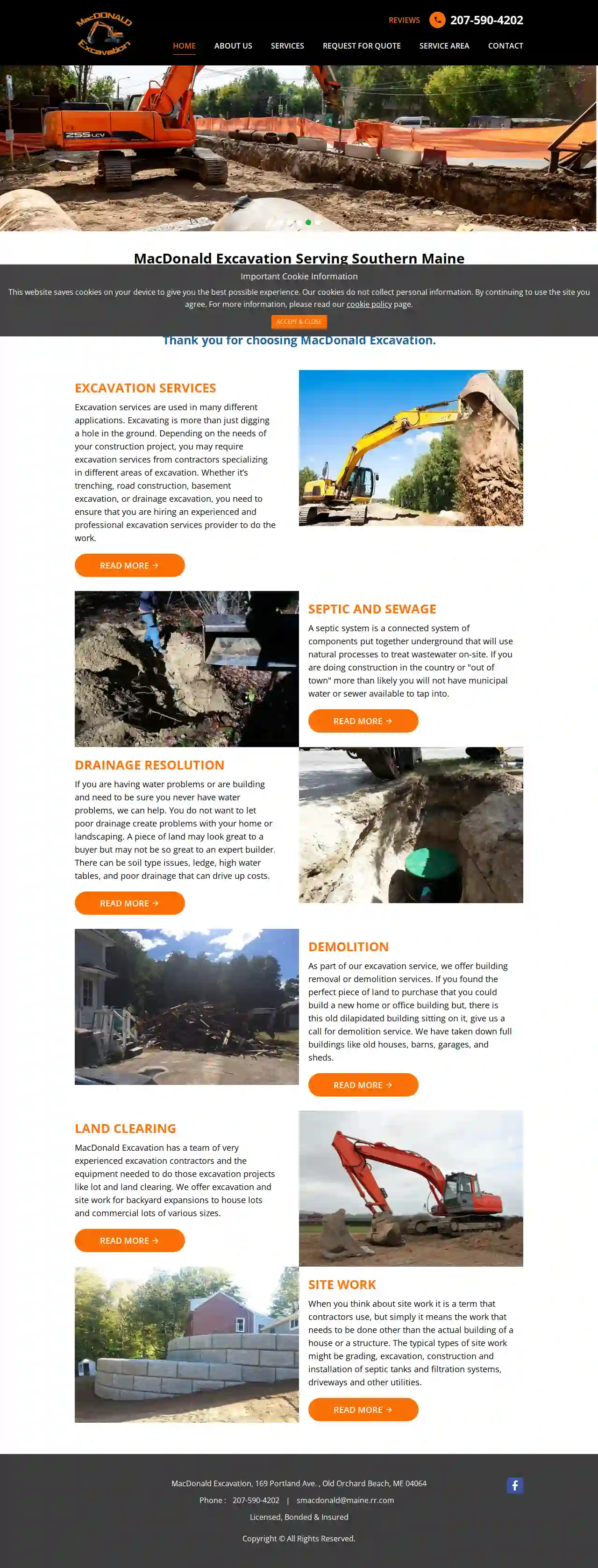
MacDonald Excavation, Excavating Contractors in Cumberland & York County
51 reviews169 Portland Ave., Old Orchard Beach, 04064, GBMacDonald Excavation Serving Southern Maine MacDonald Excavation is a full-service excavation contractor providing residential excavation services and commercial excavation services to southern Maine for over 25 years. With our expert excavation experience, we service homeowners, contractors, builders and towns to provide the skill needed for small yard projects to larger projects that require licensing, bonding and safety regulations. Thank you for choosing MacDonald Excavation.
- Services
- Why Us?
- Gallery
Get Quote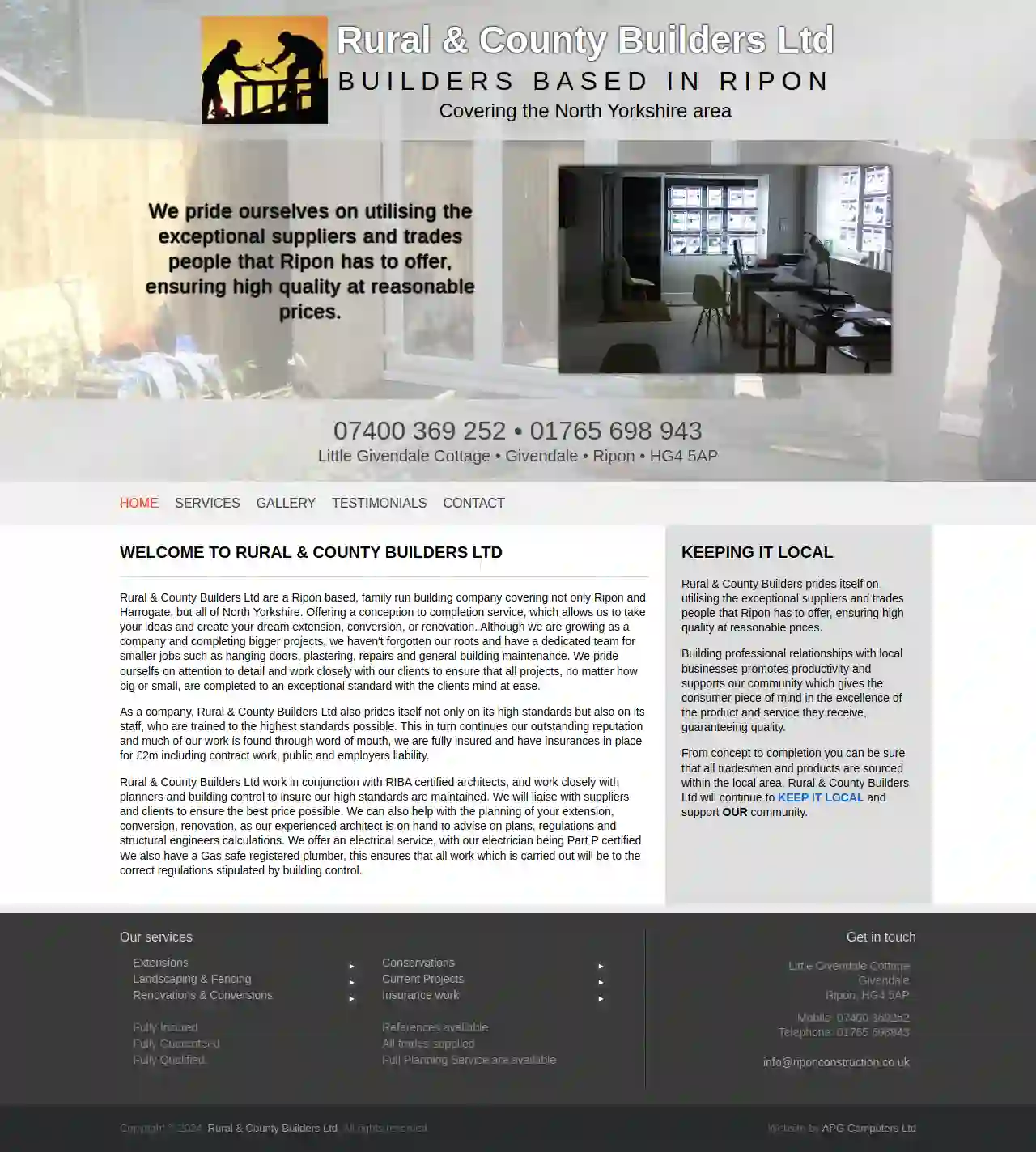
Rural & County Builders Ltd
4.726 reviewsLittle Givendale Cottage, GivendaleRipon, Little Givendale CottageGivendaleRipon, Ripon, HG4 5AP, GBAbout Rural & County Builders Ltd Rural & County Builders Ltd is a family-run building company based in Ripon, North Yorkshire. We offer a comprehensive service, from conception to completion, allowing us to transform your ideas into reality. Whether you're dreaming of a stunning extension, a stylish conversion, or a complete renovation, we're here to help. While we've grown as a company and taken on larger projects, we haven't forgotten our roots. We have a dedicated team for smaller jobs, such as hanging doors, plastering, repairs, and general building maintenance. We're committed to delivering exceptional standards, no matter the size of the project, and we work closely with our clients to ensure their complete satisfaction. At Rural & County Builders Ltd, we pride ourselves not only on our high standards but also on our highly trained staff. This dedication to excellence has earned us an outstanding reputation, with much of our work coming through word-of-mouth referrals. We are fully insured, with £2 million in coverage, including contract work, public and employers liability. We collaborate with RIBA certified architects and work closely with planners and building control to maintain our high standards. We liaise with suppliers and clients to ensure the best possible prices. Our experienced architect is on hand to advise on plans, regulations, and structural engineering calculations. We also offer electrical services through our Part P certified electrician and have a Gas Safe registered plumber, ensuring all work meets the highest standards. We believe in supporting our local community and utilize the exceptional suppliers and tradespeople that Ripon has to offer, ensuring high quality at reasonable prices. Building professional relationships with local businesses promotes productivity and supports our community, giving our clients peace of mind in the excellence of the product and service they receive. From concept to completion, you can be sure that all tradesmen and products are sourced locally. Rural & County Builders Ltd is committed to KEEPING IT LOCAL and supporting OUR community.
- Services
- Why Us?
- Testimonials
- Gallery
Get Quote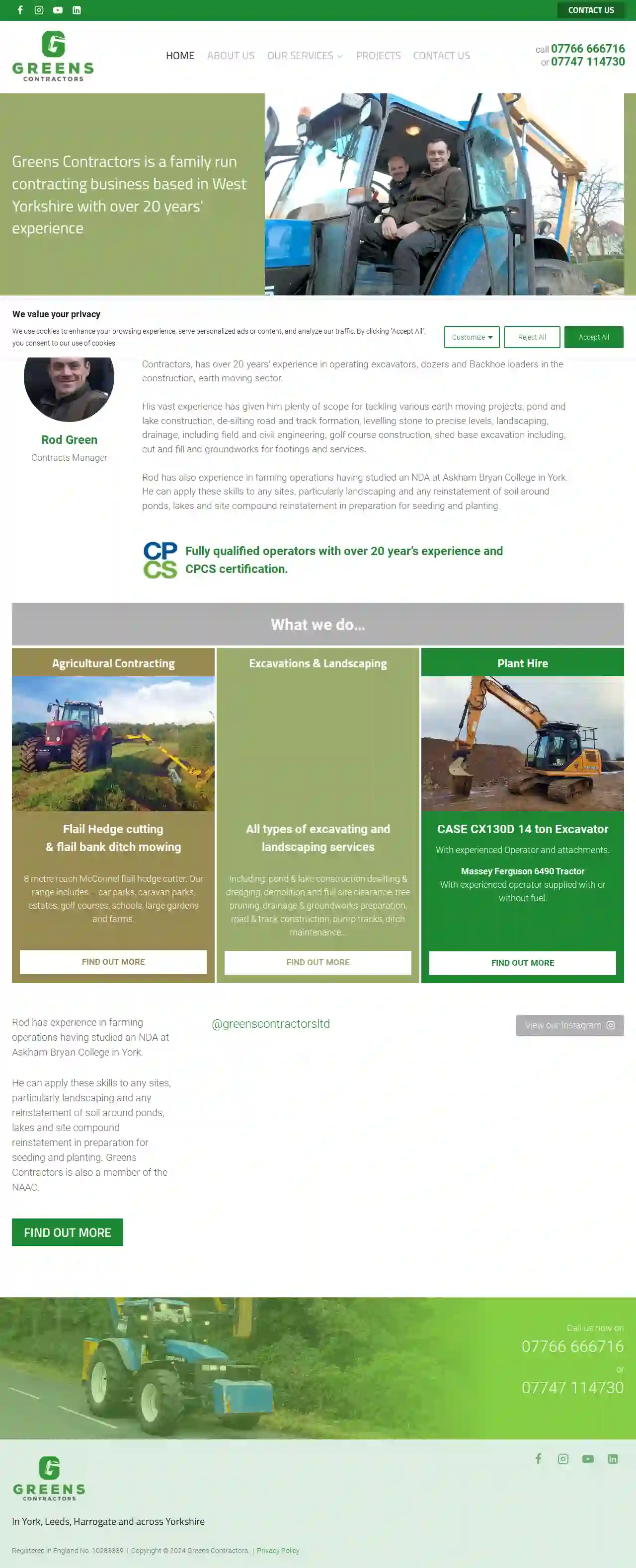
Greens Contractors Ltd
51 reviews15 Northgates, Wetberby, Leeds, Wetherby, LS22 6NX, GBGreens Contractors: Your Trusted Partner for Groundworks and Excavation in Yorkshire Greens Contractors is a family-run contracting business based in West Yorkshire with over 20 years of experience. We are dedicated to providing high-quality contracting work for a wide range of projects, from agricultural contracting to excavations and landscaping. Our team of experienced operators, led by Rod Green, Contracts and Operations Manager, brings a wealth of expertise to every job. Rod has over 20 years of experience in operating excavators, dozers, and backhoe loaders in the construction and earth-moving sector. He has a proven track record of successfully tackling various projects, including pond and lake construction, de-silting, road and track formation, leveling stone to precise levels, landscaping, drainage, field and civil engineering, golf course construction, shed base excavation, cut and fill, and groundworks for footings and services. Rod's expertise extends beyond construction. He also has experience in farming operations, having studied an NDA at Askham Bryan College in York. This allows him to apply his skills to any site, particularly landscaping and reinstatement of soil around ponds, lakes, and site compound reinstatement in preparation for seeding and planting. At Greens Contractors, we are committed to providing our clients with the highest level of service and professionalism. Our team is fully qualified and CPCS certified, ensuring that all work is carried out to the highest standards. We are also members of the NAAC, demonstrating our commitment to quality and safety. Whether you need agricultural contracting, excavations, landscaping, or plant hire, Greens Contractors is your trusted partner. Contact us today for a free, no-obligation quote.
- Services
- Why Us?
- Our Team
- Gallery
Get Quote
York Osteoarchaeology Ltd
4.73 reviewsIvy Cottage, 75 Main Street, Ivy Cottage · 75 Main Street · Bishop Wilton · York, York, YO42 1SR, GBYork Osteoarchaeology York Osteoarchaeology is a leading specialist in the excavation, processing, analysis, reporting and publication of human remains. We are the largest independent osteoarchaeological company in the UK. We provide professional osteological services to archaeological contractors and academic institutions, including: Advice for pre-contract planning On-site consultation Assessment of burials in situ Excavation, lifting and processing of burials Osteological and palaeopathological analysis Analysis of inhumed and cremated human remains Integration of results with the archaeological context Research and comparative analysis Reappraisal of existing collections Preparation of exhibitions and museum displays Presentation of results in reports, publications and lectures Additional research using biomolecular analyses
- Services
- Why Us?
Get Quote
Over 13,059+ Excavation Contractors on our platform
Our excavation companies operate in York and surroundings!
ExcavationHQ has curated and vetted the Best Excavation Contractors in York. Find a top & trustworthy business today.
Frequently Asked Questions About Dirt Contractors
- Large-Scale Excavation: Assessing soil conditions, designing slopes, and ensuring stability for large excavation projects.
- Foundation Design: Determining the appropriate foundation type and depth based on soil bearing capacity and other factors.
- Retaining Walls: Designing retaining walls to stabilize slopes, prevent erosion, or create level areas on sloped sites.
- Slope Stability Analysis: Evaluating the stability of slopes and recommending measures to prevent landslides or erosion.
- Contaminated Soil Remediation: Developing and implementing plans to clean up contaminated soil.
- Clear the Area: Remove any obstacles, such as furniture, toys, or landscaping features, from the designated delivery zone.
- Mark Utilities: Contact your local utility companies to have underground utilities, such as water lines, gas lines, or electrical cables, marked to prevent accidental damage during delivery.
- Protect Existing Landscaping: Cover or move any valuable plants, shrubs, or trees that might be affected by the dirt delivery.
- Provide Access: Ensure the delivery truck has clear access to the delivery zone, including wide enough gates or driveways.
- Communicate with the Contractor: Discuss any specific instructions or concerns you have with the dirt contractor before delivery day.
- Dirt Removal: Excavating and hauling away excess dirt or soil from construction sites, landscaping projects, or other areas.
- Dirt Delivery: Transporting and delivering various types of dirt, such as topsoil, fill dirt, sand, or gravel, for construction, landscaping, or gardening purposes.
- Grading: Leveling or sloping land to achieve specific contours for drainage, landscaping, or construction projects.
- Excavation: Digging trenches, foundations, basements, pools, or other structures requiring earthmoving.
- Land Clearing: Removing trees, vegetation, and debris to prepare land for development or other uses.
- Site Preparation: A combination of services, including clearing, grading, and compaction, to prepare a site for construction or landscaping.
What is the difference between screened topsoil and unscreened topsoil?
Screened Topsoil: Processed through a screening machine to remove large debris, rocks, and clumps, resulting in a finer and more uniform texture. It's generally considered higher quality and is preferred for landscaping, gardening, and lawn establishment.
Unscreened Topsoil: Not processed through a screening machine and may contain various sizes of debris, rocks, and clumps. It's typically less expensive than screened topsoil but may require additional work to remove debris before use.
Choosing between screened and unscreened topsoil depends on your project's specific needs and budget.
What is a soil engineer, and when might I need one?
How do I prepare my yard for dirt delivery?
What services do dirt contractors provide?
What is the difference between screened topsoil and unscreened topsoil?
Screened Topsoil: Processed through a screening machine to remove large debris, rocks, and clumps, resulting in a finer and more uniform texture. It's generally considered higher quality and is preferred for landscaping, gardening, and lawn establishment.
Unscreened Topsoil: Not processed through a screening machine and may contain various sizes of debris, rocks, and clumps. It's typically less expensive than screened topsoil but may require additional work to remove debris before use.
Choosing between screened and unscreened topsoil depends on your project's specific needs and budget.
What is a soil engineer, and when might I need one?
- Large-Scale Excavation: Assessing soil conditions, designing slopes, and ensuring stability for large excavation projects.
- Foundation Design: Determining the appropriate foundation type and depth based on soil bearing capacity and other factors.
- Retaining Walls: Designing retaining walls to stabilize slopes, prevent erosion, or create level areas on sloped sites.
- Slope Stability Analysis: Evaluating the stability of slopes and recommending measures to prevent landslides or erosion.
- Contaminated Soil Remediation: Developing and implementing plans to clean up contaminated soil.
How do I prepare my yard for dirt delivery?
- Clear the Area: Remove any obstacles, such as furniture, toys, or landscaping features, from the designated delivery zone.
- Mark Utilities: Contact your local utility companies to have underground utilities, such as water lines, gas lines, or electrical cables, marked to prevent accidental damage during delivery.
- Protect Existing Landscaping: Cover or move any valuable plants, shrubs, or trees that might be affected by the dirt delivery.
- Provide Access: Ensure the delivery truck has clear access to the delivery zone, including wide enough gates or driveways.
- Communicate with the Contractor: Discuss any specific instructions or concerns you have with the dirt contractor before delivery day.
What services do dirt contractors provide?
- Dirt Removal: Excavating and hauling away excess dirt or soil from construction sites, landscaping projects, or other areas.
- Dirt Delivery: Transporting and delivering various types of dirt, such as topsoil, fill dirt, sand, or gravel, for construction, landscaping, or gardening purposes.
- Grading: Leveling or sloping land to achieve specific contours for drainage, landscaping, or construction projects.
- Excavation: Digging trenches, foundations, basements, pools, or other structures requiring earthmoving.
- Land Clearing: Removing trees, vegetation, and debris to prepare land for development or other uses.
- Site Preparation: A combination of services, including clearing, grading, and compaction, to prepare a site for construction or landscaping.